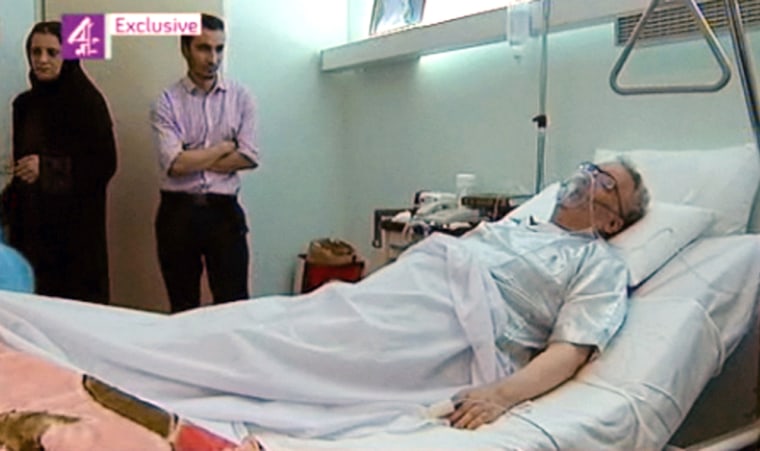A Libyan official said the man convicted of the Lockerbie bombing has been hospitalized and television footage showed him breathing through an oxygen mask, signs his illness from cancer may be worsening shortly after his early prison release sparked international outrage.
The Libyan Secretary of State for Foreign Affairs, Mohammed Siala, said Monday that Abdel Baset al-Megrahi was in the hospital and described him as a "dying man."
"He is in the hospital, he is a dying man, it is normal than he came to spend his last few days in Libya," Siala told The Associated Press.
His comments came after Britain's Channel 4 television Sunday night showed footage of the 57-year-old al-Megrahi in a Tripoli hospital bed propped up by pillows and wearing an oxygen mask while some members of his family stood nearby. A reporter can be heard asking al-Megrahi a question about his case but al-Megrahi appears too weak to answer.
Al-Megrahi was convicted of bombing Pan Am Flight 103 over Lockerbie, Scotland, in 1988, killing 259 people on the plane and 11 on the ground. Scotland released him Aug. 20 on compassionate grounds because doctors said he was dying of prostate cancer.
Received a cheering welcome
His release and return to Libya where he was greeted warmly at the airport by hundreds of cheering supporters has led to outrage from many of the Lockerbie victims and questions about whether his release was secured in order to facilitate lucrative oil trade with Libya.
Both Britain and Scotland have denied that business had anything to do with allowing al-Megrahi to leave prison after completing only eight years of his life sentence.
On Monday, the British government said will make public its correspondence with Scottish ministers over releasing al-Megrahi, a government spokeswoman said, a day after a newspaper reported that officials believed a deal was in the U.K.'s "overwhelming interests."
A spokeswoman at Prime Minister Gordon Brown's office said all "relevant correspondence" between British ministers and the Scottish executive over al-Megrahi would be released Tuesday, but would not give any more details. She spoke anomymously in line with government policy.
The Sunday Times reported that the British government allowed al-Megrahi to be included in a prisoner transfer agreement because it was in the U.K.'s interest as a major oil deal was being negotiated.
Jack Straw, Britain's justice minister, had originally tried to ensure that al-Megrahi was exempted from any prisoner transfer agreement with Libya, but in December 2007 he wrote MacAskill saying "wider negotiations with the Libyans are reaching a critical stage and, in the view of the overwhelming interests for the United Kingdom" a standard prisoner transfer agreement, that would apply to all prisoners with no exemptions, would be agreed to, the Times said.
Released on compassionate grounds
The oil deal, the Times reported, was concluded six weeks later.
Al-Magrahi was released this month on compassionate grounds, instead of through a prisoner transfer agreement. Scottish officials and British officials insist that there is no connection between any oil deals and al-Megrahi's release.
"There was no deal over (the) release of al-Megrahi nor could there ever be, since all decisions were for the Scottish, not U.K. government," Downing Street said in a statement released Monday. "The central assertion in this story is completely untrue and deeply misleading."
Straw called any suggestion that there was a secret, backdoor deal "untrue" and called it "academic" because the Scottish government sent him to Tripoli on compassionate grounds rather than by transfer agreement.
U.S. State Department spokesman Ian Kelly said the U.S would leave Britain to deal with the allegations. "It is up to the British government to work these things through. We have complete faith in the British system to air these allegations in a complete and transparent way," he told reporters in Washington.
Nicola Sturgeon, Scotland's deputy first minister, also told the BBC she didn't know what agreements the British government had made, and said the decision of Scottish justice secretary Kenny MacAskill to release al-Megrahi on compassionate grounds was based on legal principles.
"What I do know, and what I can state categorically ... is that these deals — if such deals existed — played no part whatsoever in the decision that Kenny MacAskill took to release al-Megrahi on compassionate grounds," Sturgeon said. "That was a decision taken entirely on justice grounds, and there were no influences relating to political or economic interests that played any part in that."
MacAskill told reporters in Scotland that his "decision was based not on any political, economic or diplomatic considerations."
Only man convicted in case
Al-Megrahi, who has terminal prostate cancer, is the only man convicted in the 1988 bombing of Pan Am Flight 103 over Lockerbie, Scotland. The explosion of a bomb hidden in the cargo hold killed all 259 people on the plane and 11 on the ground in Britain's worst terrorist attack.
In Libya, there was no way to independently verify al-Megrahi's condition, and the Libyan official offered no further details. Al-Megrahi underwent extensive medical testing before Scottish officials confirmed his cancer diagnosis, but questions have been raised about the seriousness of his condition.
The London-based Asharq Al-Awssat newspaper last Wednesday quoted al-Megrahi's father as saying that the former Libyan inmate was not dying.
"It is not that serious as some news media have been portraying," Ali al-Megrahi told the newspaper. "I see he is improving day by day, and he is better than the day he returned."
More on: Abdul Basset al-Megrahi| Libya
